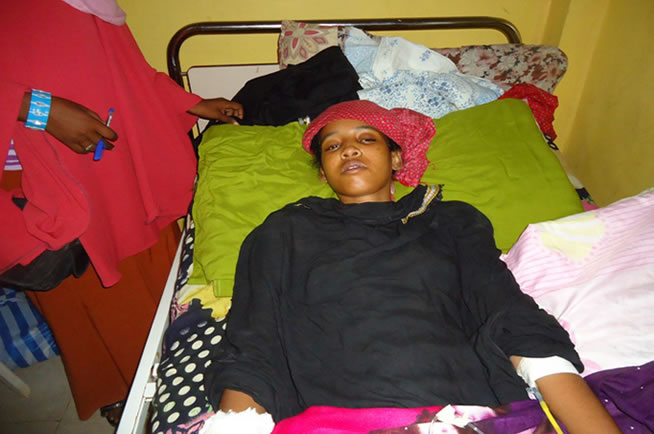
Journalist Horriyo Abdulkadir Ali at GMC hospital in Galkayo - Sept 2011

By Abdi Latif Dahir
Saturday, February 25, 2012
“It was September 11 when the first call came through,” Abdulkadir said on a recent morning in a Nairobi hotel. “The caller just started saying: ‘You are an infidel. Stop what you are doing. You are not going to get away with it.’”
At first, Abdulkadir, who covered women's issues, politics and militia groups for Radio Galkayo, was non-plussed by the call.
“I knew there was some danger involved," she said. "But I was a journalist and I wasn’t going to stop what I was doing.”
Three days later, walking home from work, two hooded men approached her and shot her five times. Four bullets hit her chest, one tore through her arm.
Abdulkadir, who was treated in Galkayo and then flown to Nairobi for further treatment, is one of a rising number of Somali journalists to come under attack.
"Somali journalists are stuck between a rock and a hard place,” said Tom Rhodes, a consultant on the East Africa for the Committee to Protect Journalists. “Critical reporting on the militias and, as the latest journalist murder cases seems to indicate, the government, can lead to imprisonment, even death.”
In recent years, many Somali journalists have been forced to flee to the nearest, safest haven. To escape imprisonment and death, they sneak out of the country on buses. Some trek on foot. The lucky ones find a Good Samaritan to pay for a plane ticket to Nairobi.
Their tribulations don’t stop once they cross the border. Asylum letters from the U.N. High Commission for Refugees are hard to come by. Without money, the expatriate journalists crowd into apartments with colleagues in dodgy neighborhoods.
“Life for an exiled Somali journalist is not easy,” Rhodes said. “Many are based in Eastleigh where predatory landlords and corrupt police capitalize on their plight through overpriced housing and illegal arrests. Further, many are not safe from Al-Shabaab and receive threats in exile just as they did in Somalia.”
In Kenya, Somali journalists struggle to find regular work. Few speak English or Swahili, Kenya's national languages.
“Once they are in Kenya, they become like a fish living in a desert,” said Abdikafar Shire, who heads up a network of exiled Somali journalists. “They wait for years before they are resettled. And every journalist who lives here and finds some work supports at least three or four others who can’t pay for their expenses. It is very hard.”
Shire estimates that there are almost 150 Somali journalists living in Nairobi and Kenyan refugee camps. Shire's estimates square with a recent report by the Committee to Protect Journal, which said that Kenya hosts more exiled journalists than any country in the world except the United States.
Mohamed Ahmed Mohamed left the semi-autonomous region of Puntland in northeastern Somalia after winning a media award from the United Nations in 2008. Mohamed, who worked for the Somalia Broadcasting Corp. at the time, said he fled after his name was published in a local newspaper alongside other winners.
“There was a deal not to publish the names," Mohamed said. "However, a local newspaper printed the names in an article. The mere fact that I won the award made them think that I was serving specific foreign interests. They started calling me a spy, a journalist with a foreign agenda.”
Mohamed decided to leave on the day of a friend's wedding. His family called and told him not to return home that night.
“I was told several men were standing near my house the whole day," Mohamed said. "So I decided to sleep in a hotel for the night."
In the morning, he received a call: “You escaped last night but you will not survive for long.”
For Somali journalists who long to leave Kenya and return home, the lingering threat of violence is a deterrent.
“They threatened my family, saying that you can’t make her disappear forever,” Abdulkadir said. “Even if I stayed back home, and made sure I locked myself in my room, I wouldn’t be safe at all.”
In January, an unknown gunman killed Hassan Osman Abdi, the director of the independent news network, Shabelle, outside of his home in Mogadishu. Abdi's death came just a month after a man wearing government military fatigues killed Abdisalam Sheikh Hassan, a journalist with Horn Cable TV.
The Committee to Protect Journalists estimates that 37 journalists have been killed in Somalia since 1993, with the highest number of deaths recorded in 2007 and 2009. Reporters Without Borders, the press freedom watchdog group, has consistently ranked Somalia one of the most dangerous places for journalists.
“Many exiled journalists in Kenya were thinking of going back but Hassan’s killing has stopped it all,” said Mohamed Mascud, a Shabelle contributor from Nairobi who worked with Hassan. “He understood the dynamics of the media in Somalia. He was very open-minded and had a nose for news.”
Mascud, an exile himself, said he left Somalia after he was targeted three times by al-Shabaab militants for reporting on their activities in Mogadishu.
As the number of exiled journalists swell, awareness about the plight of Somali journalists is increasing.
“There is strength in numbers,” Rhodes said. “Somali exiled journalists are starting to organize themselves. Together with the exiled community, we hope we can lobby on their behalf in terms of civil rights and ensure they are not exploited by their predicament.”
For now, journalists like Horriyo Abdulkadir and Mohamed Ahmed wonder whether they will ever return home and continue their work.
“My own name, Horriyo, means 'freedom' in Arabic,” Abdulkadir said of her first name. “But we don’t have freedom in Somalia at all.”
Source: UPI